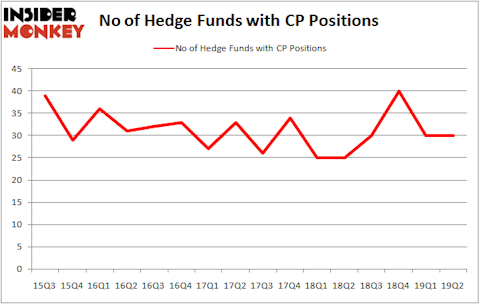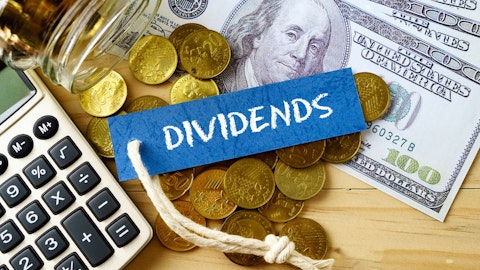We can judge whether Canadian Pacific Railway Limited (NYSE:CP) is a good investment right now by following the lead of some of the best investors in the world and piggybacking their ideas. There’s no better way to get these firms’ immense resources and analytical capabilities working for us than to follow their lead into their best ideas. While not all of these picks will be winners, our research shows that these picks historically outperformed the market when we factor in known risk factors.
Hedge fund interest in Canadian Pacific Railway Limited (NYSE:CP) shares was flat at the end of last quarter. This is usually a negative indicator. At the end of this article we will also compare CP to other stocks including Thomson Reuters Corporation (NYSE:TRI), TE Connectivity Ltd. (NYSE:TEL), and Carnival Corporation & Plc (NYSE:CUK) to get a better sense of its popularity. Our calculations also showed that CP isn’t among the 30 most popular stocks among hedge funds (see the video below).

Video: Click the image to watch our video about the top 5 most popular hedge fund stocks.
Hedge funds’ reputation as shrewd investors has been tarnished in the last decade as their hedged returns couldn’t keep up with the unhedged returns of the market indices. Our research has shown that hedge funds’ large-cap stock picks indeed failed to beat the market between 1999 and 2016. However, we were able to identify in advance a select group of hedge fund holdings that outperformed the market by 40 percentage points since May 2014 through May 30, 2019 (see the details here). We were also able to identify in advance a select group of hedge fund holdings that’ll significantly underperform the market. We have been tracking and sharing the list of these stocks since February 2017 and they lost 25.7% through September 30, 2019. That’s why we believe hedge fund sentiment is an extremely useful indicator that investors should pay attention to.

Unlike some fund managers who are betting on Dow reaching 40000 in a year, our long-short investment strategy doesn’t rely on bull markets to deliver double digit returns. We only rely on hedge fund buy/sell signals. Let’s take a gander at the new hedge fund action encompassing Canadian Pacific Railway Limited (NYSE:CP).
What have hedge funds been doing with Canadian Pacific Railway Limited (NYSE:CP)?
Heading into the third quarter of 2019, a total of 30 of the hedge funds tracked by Insider Monkey were bullish on this stock, a change of 0% from the previous quarter. On the other hand, there were a total of 25 hedge funds with a bullish position in CP a year ago. So, let’s find out which hedge funds were among the top holders of the stock and which hedge funds were making big moves.

Of the funds tracked by Insider Monkey, Egerton Capital Limited, managed by John Armitage, holds the most valuable position in Canadian Pacific Railway Limited (NYSE:CP). Egerton Capital Limited has a $911.8 million position in the stock, comprising 6.7% of its 13F portfolio. The second largest stake is held by Stephen Mandel of Lone Pine Capital, with a $636.6 million position; 4% of its 13F portfolio is allocated to the stock. Remaining hedge funds and institutional investors that are bullish contain Peter Rathjens, Bruce Clarke and John Campbell’s Arrowstreet Capital, Steve Cohen’s Point72 Asset Management and Brandon Haley’s Holocene Advisors.
Because Canadian Pacific Railway Limited (NYSE:CP) has faced falling interest from hedge fund managers, we can see that there lies a certain “tier” of money managers that decided to sell off their positions entirely in the second quarter. At the top of the heap, Cliff Asness’s AQR Capital Management sold off the largest stake of the 750 funds followed by Insider Monkey, valued at about $21.4 million in stock, and Dmitry Balyasny’s Balyasny Asset Management was right behind this move, as the fund said goodbye to about $6.8 million worth. These transactions are intriguing to say the least, as aggregate hedge fund interest stayed the same (this is a bearish signal in our experience).
Let’s go over hedge fund activity in other stocks – not necessarily in the same industry as Canadian Pacific Railway Limited (NYSE:CP) but similarly valued. These stocks are Thomson Reuters Corporation (NYSE:TRI), TE Connectivity Ltd. (NYSE:TEL), Carnival Corporation & Plc (NYSE:CUK), and LyondellBasell Industries NV (NYSE:LYB). This group of stocks’ market valuations are similar to CP’s market valuation.
| Ticker | No of HFs with positions | Total Value of HF Positions (x1000) | Change in HF Position |
|---|---|---|---|
| TRI | 17 | 316318 | 0 |
| TEL | 27 | 1350859 | 1 |
| CUK | 10 | 121231 | 2 |
| LYB | 45 | 2065988 | 9 |
| Average | 24.75 | 963599 | 3 |
View table here if you experience formatting issues.
As you can see these stocks had an average of 24.75 hedge funds with bullish positions and the average amount invested in these stocks was $964 million. That figure was $2314 million in CP’s case. LyondellBasell Industries NV (NYSE:LYB) is the most popular stock in this table. On the other hand Carnival Corporation & Plc (NYSE:CUK) is the least popular one with only 10 bullish hedge fund positions. Canadian Pacific Railway Limited (NYSE:CP) is not the most popular stock in this group but hedge fund interest is still above average. This is a slightly positive signal but we’d rather spend our time researching stocks that hedge funds are piling on. Our calculations showed that top 20 most popular stocks among hedge funds returned 24.4% in 2019 through September 30th and outperformed the S&P 500 ETF (SPY) by 4 percentage points. Unfortunately CP wasn’t nearly as popular as these 20 stocks and hedge funds that were betting on CP were disappointed as the stock returned -5.2% during the third quarter and underperformed the market. If you are interested in investing in large cap stocks with huge upside potential, you should check out the top 20 most popular stocks among hedge funds as many of these stocks already outperformed the market so far this year.
Disclosure: None. This article was originally published at Insider Monkey.





